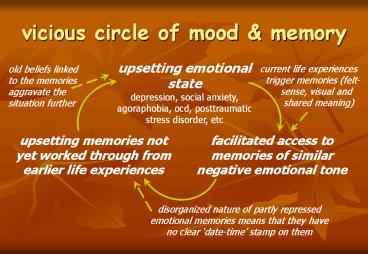vicious circle of mood - PowerPoint PPT Presentation
1 / 6
Title:
vicious circle of mood
Description:
upsetting emotional state depression, social anxiety, agoraphobia, ocd, posttraumatic stress disorder, etc current life experiences trigger memories (felt- – PowerPoint PPT presentation
Number of Views:36
Avg rating:3.0/5.0
Title: vicious circle of mood
1
vicious circle of mood memory
upsetting emotional state depression, social
anxiety, agoraphobia, ocd, posttraumatic stress
disorder, etc
old beliefs linked to the memories aggravate the
situation further
current life experiences trigger memories
(felt- sense, visual and shared
meaning)
facilitated access to memories of similar
negative emotional tone
upsetting memories not yet worked through from
earlier life experiences
disorganized nature of partly repressed emotional
memories means that they have no clear
date-time stamp on them
2
depression imagery research
- Kuyken W Brewin CR Intrusive memories of
child- hood abuse during depressive episodes
Behav Res Ther 199432525-8 - Kuyken W Brewin CR Autobiographical memory
functioning in depression and reports of early
abuse J Abnorm Psychol 1995104585-91 - Andrews B Bodily shame as a mediator between
abusive experiences and depression J Abnorm
Psychol 1995104277-85 - Brewin CR Cognitive processing of adverse
experiences Int Rev Psychiat 19968333-9 - Brewin CR, Reynolds M, et al. Autobiographical
memory processes and the course of depression.
J Abnorm Psychol 1999 108(3) 511-7.
3
trauma memories depression 1
- 31 sufferers from current depression were asked
about deaths of family or friends about other
major life events - questioned too about events they felt might have
triggered the current episode of depression
about childhood - for example harsh discipline or
unwanted sexual experiences - asked too about related memories these were
defined as spontaneous visual images of
specific scenes that had actually taken place - 87 of these current depression sufferers said
yes - they had experienced 1-5 different
intrusive images (avge 2.6)
Brewin CR, Hunter E, Carroll F Tata P
Intrusive memories in depression an index of
schema activation? Psychol Med 1996261271-6
4
trauma memories depression 2
- 55 of these intrusive memory images involved
illness or death 21 involved relationship
or family problems 18 involved abuse and
assault - memories were usually associated with mixed
feelings of sadness, guilt, anger and
helplessness, and to a lesser extent anxiety and
shame - scoring these depressive memories using the IES
showed that they had similar scores to memories
found in PTSD - memories of past abuse and of assault tended to
be associated with higher IES scores and with
severer levels of depression
5
clinical implications 1
- its common for depression sufferers to be
troubled by significant trauma memories - high levels of intrusion associated avoidance
of trauma memories (high IES scores)
are associated with more prolonged
depression even when allowing for the
initial severity of psychiatric symptoms - it seems likely that asking about trauma
memories using emotional processing methods
that lower IES scores may well speed recovery and
possibly may even reduce relapse
6
social anxiety imagery research
- Hackmann A, Surawy C, et al. Seeing yourself
through others' eyes A study of spontaneously
occurring images in social phobia. Behavioural
and Cognitive Psychotherapy 1998 26 3-12 - Wells A. Papageorgiou C. The observer
perspective biased imagery in social phobia,
agoraphobia, and blood/injury phobia. Behav Res
Ther 1999 37(7) 653-8. - Hackmann A, Clark DM, et al. Recurrent images
early memories in social phobia. Behav Res Ther
2000 38(6) 601-10. - Hernández-Guzmán L, González S, et al. Effect of
guided imagery on children's social performance.
Behavioural and Cognitive Psychotherapy 2002
30 471-483. - Hirsch C, and Mathews A. Anticipatory imagery
and the develop-ment of social anxiety. BABCP
Annual Conference Abstracts pp 11-12. York,
2003. - Hirsch CR, Meynen T, et al. Negative
self-imagery in social anxiety contaminates
social interactions. Memory 2004 12(4) 496-506

